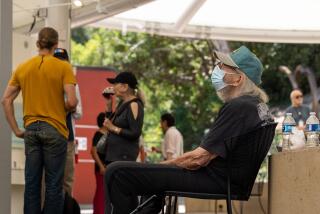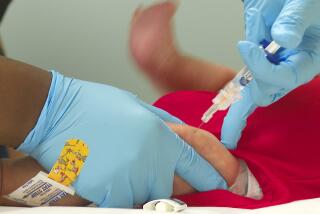Op-Ed: Misguided doctors and bad information are fueling the return of measles
Before the creation of a vaccine in 1963, measles infected 3 to 4 million people a year in the United States. Nearly 50,000 measles patients each year required hospitalization, and the disease infected the brains of 1,000 and killed 400 to 500 people.
Today, we shouldn’t be seeing any cases. The vaccine is widely available to all, regardless of ability to pay for it. And yet, this year has brought a major outbreak of measles, largely because of a scientifically unfounded fear of vaccinations in some communities. Of the 764 people so far infected, the great majority were unvaccinated. California reported 40 cases, many from unvaccinated travelers returning with the infection.
In 2015, after a measles outbreak that started at Disneyland infected 117 Californians, most of them unvaccinated, the state passed SB 277 to abolish nonmedical exemptions for the vaccinations legally required for school enrollment. SB 277 raised immunization rates above 95% in the last two kindergarten classes, which may be blunting the spread of measles brought into our state. But we need further measures.
Thirty years ago, measles outbreaks were caused by insufficient access to vaccines; today they are caused by misinformation.
One problem has been that public universities have been slower to respond. The UC Regents finally adopted stricter vaccination requirements, but this year’s freshman class is the first to have been affected, which means most students came in under the old, laxer requirements. The California State University system issued a new vaccination policy in March that abolishes personal belief and religious exemptions, but again it was late in coming. As a consequence of the delayed response, hundreds of students had to be quarantined at UCLA and Cal State L.A. in response to measles exposures.
Measles is not the only vaccine-preventable disease returning. A baby died of whooping cough in Orange County last month and another died in San Bernardino the previous July. These deaths recall that in 2010, California experienced a whooping cough outbreak that infected 9,120 people and killed 10 infants too young to be vaccinated. The disease spread mainly in communities with low vaccination rates.
Community immunity, the shield that protects babies and others who cannot be vaccinated, requires that the people surrounding them at school and in their communities are vaccinated. Although the state-wide vaccination rate is improving, there are too many schools without this so-called herd immunity, because of vaccination rates below 90% and even below 50%.
Some of the blame rests with unethical doctors, who are willing to take patients’ money and grant inappropriate medical exemptions to misinformed families, thereby putting other children at risk. A Voice of San Diego investigation of medical exemptions at San Diego Unified School District showed that almost a third were issued by one doctor who advertised medical exemptions. Two other physicians who issued large numbers of medical exemptions are on probation with the Medical Board of California.
Enter the Fray: First takes on the news of the minute »
The state Legislature, of which I am a member, has an opportunity to greatly improve the situation. Senate Bill 276, sponsored by the California Medical Assn. and the California American Academy of Pediatrics, would require review by public health officials before medical exemptions from vaccination requirements are approved. It would also create a database of medical exemption requests so the state’s medical board can better investigate unethical physicians.
Thirty years ago, measles outbreaks were caused by insufficient access to vaccines; today they are caused by misinformation and fueled by doctors who should know better. The World Health Organization recently declared vaccine refusal a global health threat, noting that it has fueled measles outbreaks and deaths around the world. Last year, Europe had 83,000 confirmed cases of measles and 72 deaths. And the U.S. is now at risk of joining the failed state of Venezuela as the only country in the Americas to lose its “measles elimination” status.
But there is also cause for hope, as other states look to California’s success in limiting the spread of measles by considering legislation to abolish nonmedical exemptions. We should also keep pushing here to close loopholes and educate parents. We have the right to community immunity to keep all of us safe.
Richard Pan is a practicing pediatrician and a California state senator (D-Sacramento).
More to Read
A cure for the common opinion
Get thought-provoking perspectives with our weekly newsletter.
You may occasionally receive promotional content from the Los Angeles Times.










